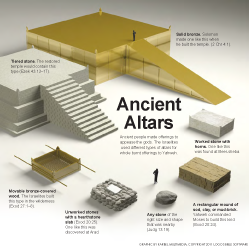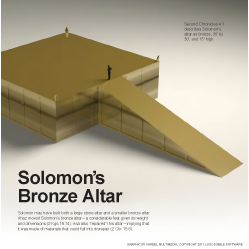3:1–15 Now that the kingdom of Israel has been established as Solomon’s (2:46), the narrative turns toward Solomon’s activities—particularly his building projects (chs. 3–11). Solomon’s wisdom (2:6) also appears as a recurring theme (vv. 3–28; 4:29–34; 5:12; 10:1–10, 23–25; 11:41). This passage briefly introduces Solomon’s political and religious activities (vv. 1–2) and then focuses on his divinely appointed wisdom (vv. 3–15). The extensive description of Solomon’s wisdom suggests that the author supported Solomon’s activities, despite his political and religious pitfalls (vv. 1–2; 11:1–40). |
3:1 Solomon intermarried with The Hebrew phrase used here, yithchatten eth, is literally rendered “Solomon made himself a son-in-law to.” In the ancient Near East, the practice of marrying the daughters of neighboring rulers served as a peace treaty. While Solomon’s reign represented a period of peace (4:24–25), foreign marriage alliances eventually caused the kingdom to crumble from within (11:1–8).
the daughters of neighboring rulers served as a peace treaty. While Solomon’s reign represented a period of peace (4:24–25), foreign marriage alliances eventually caused the kingdom to crumble from within (11:1–8).
until he finished building his house A period of 20 years (1 Kings 9:10).
his house See 7:1–12.
the house of Yahweh See 5:1–6:38; 7:13–8:11.
3:2 the house for the name of Yahweh had not yet been built in those days Foreshadows the building of the temple (chs. 5–8). This phrase also recalls God’s promise (2 Sam 7:1–17) that David’s offspring will build a house for God’s name and, in return, God will establish his kingdom forever (2 Sam 7:12–16).
 The Name Theology of the Old Testament
The Name Theology of the Old Testament
3:3 David See 1 Kgs 2:1–4.
was sacrificing The word zabach refers to animal sacrifices.
 Altars in the Old Testament Table
Altars in the Old Testament Table
3:4 a thousand A general expression for a large number (e.g., Deut 1:11). Solomon did not necessarily offer 1,000 animals at Gibeon.
 Large Numbers in the Exodus and Wilderness Journey
Large Numbers in the Exodus and Wilderness Journey
3:5 in a dream at night People in the ancient Near East considered dreams and visions a means of divine revelation (see Gen 20:3; 28:12; 31:11, 24; 41:12; Num 12:6; Judg 7:15; 1 Sam 28:6; Dan 2–7).
and visions a means of divine revelation (see Gen 20:3; 28:12; 31:11, 24; 41:12; Num 12:6; Judg 7:15; 1 Sam 28:6; Dan 2–7).
3:6 loyal love The Hebrew word used here, chesed, also means “loyalty” or “reciprocal love,” depending on the context. Here, God’s chesed depends on David’s servitude.
 Chesed Word Study
Chesed Word Study
he walked before The Hebrew phrase halakh liphney means “to serve” and always appears in reference to kings serving God (compare 1 Kgs 8:23, 25; 9:4; 2 Kgs 20:3).
in faithfulness Solomon echoes David’s words in 1 Sam 26:23 (compare Deut 9:5; Job 33:3; Psa 119:7).
a son to him who is sitting on his throne Recalls God’s promise that David’s descendant would establish his kingdom forever (2 Sam 7:13).
3:7 I am a young boy A rhetorical phrase expressing inexperience and humility (compare Jer 1:6). Solomon is an adult; he had already fathered Rehoboam, his eldest son, by this time (1 Kgs 11:42–43; 14:21).
I do not know going out Indicates the king’s willingness to accept instruction in matters of public duty—especially war (Num 27:17, 21; Deut 31:2; Josh 14:11; 1 Sam 18:16).
3:8 who cannot be counted The Hebrew phrase used here also appears in reference to the sacrifices presented at the temple dedication (see 1 Kgs 8:5).
3:9 a listening heart The Hebrew phrase used here, lev shomea', literally means “hearing heart”; lev means “inner person,” “mind,” “will,” or “heart,” while shomea' means “hearing” or sometimes “observant.”
to judge your people Greek manuscripts add “with righteousness,” a concern for Yahweh’s earthly representative.
discern between good and bad Solomon looks to God for the ability to discern, since sound judgment comes from Him (see Deut 1:17; Psa 72:1–2). David also possessed this ability (2 Sam 14:17).
difficult The Hebrew word used here, kaved, literally means “heavy”; here, it means “numerous” (compare Exod 12:38).
3:10 The word was good in the eyes of the Lord The Hebrew text here literally reads “The matter was good in the eyes of Yahweh.”
3:11 the life of your enemies The only item God does not grant in 1 Kgs 3:12–14, presumably because Solomon has no more enemies after the events of 2:13–46—until God raises adversaries at the end of his reign (11:9–40).
the ability to make wise judgments The Hebrew phrase used here, havin shemoa' mishpat, expresses the idea that sound judgment comes from God. See v. 9 and note.
3:12 no one like you before you, nor afterwards will one like you arise This sentiment is echoed in 4:29–34; 10:1–13.
3:15 he came to Jerusalem This is in contrast to the great high place at Gibeon (vv. 3–5) where Solomon had the dream and offered sacrifices. Solomon’s newfound wisdom affected his decision regarding where to worship. Second Chronicles 1:5 adds that Solomon offered these sacrifices on the bronze altar that Bezalel built in the desert (Exod 36:1–2) and David installed before the ark of the covenant (2 Sam 6:16–17).
the ark of the covenant of the Lord David brought the ark of the covenant to Jerusalem and housed it in a tent (2 Sam 6).
to Jerusalem and housed it in a tent (2 Sam 6).
3:16–28 This example demonstrates Solomon’s wisdom and the fulfillment of God’s promise (see 1 Kgs 3:1–15). |
3:16 two prostitutes The only mention of their profession; otherwise, they are referred to as “the (other) woman.” Despite their low social standing, the women are allowed to appear in court; the text even describes one positively (v. 26).
otherwise, they are referred to as “the (other) woman.” Despite their low social standing, the women are allowed to appear in court; the text even describes one positively (v. 26).
they stood before him By making himself available to the public, Solomon addresses the criticism Absalom raised against David when he accused him of not holding proper hearings (2 Sam 15:3–4).
3:18 the third day An indefinite measure of time common in storytelling (e.g., Gen 22:4; 31:22; Josh 9:17; 1 Sam 30:1; 2 Sam 1:2; Esth 5:1).
3:21 When I looked closely at him The Hebrew phrase used here can be translated “I discerned him” or “I was attentive to him.” The word bin (meaning “discern”) describes both the woman’s observation and Solomon’s ability of discernment (see 1 Kgs 3:9, 11).
3:26 the woman whose son was the living one The text reveals the identity of the mother whose child was alive before describing her reaction and Solomon’s verdict.
her compassion was aroused for her son The phrase nikmeru rachameyha al-benah (meaning “her womb grew warm over her son”) comes from two terms: kamar, which means “grow warm, tender,” and rechem, which means “womb” or “compassion.” The phrase may mean the woman has compassion for her son.
3:27 Give the living child The king’s words were probably accompanied by a gesture that ensured the living child was given to the proper woman.
3:28 the wisdom of God was in him God’s promise to grant Solomon wisdom is fulfilled in the eyes of his subjects.
the wisdom of God The Hebrew phrase used here does not occur elsewhere in the ot. Divine wisdom is more than knowledge, which Solomon possessed in abundance (4:29–34). It also includes the ability to render difficult judgments. Moses sought this quality in his own judgments and in the judges he appointed (Exod 18:13–26; Deut 1:13–18; 16:19).

|
About Faithlife Study BibleFaithlife Study Bible (FSB) is your guide to the ancient world of the Old and New Testaments, with study notes and articles that draw from a wide range of academic research. FSB helps you learn how to think about interpretation methods and issues so that you can gain a deeper understanding of the text. |
| Copyright |
Copyright 2012 Logos Bible Software. |
| Support Info | fsb |
 Loading…
Loading…


